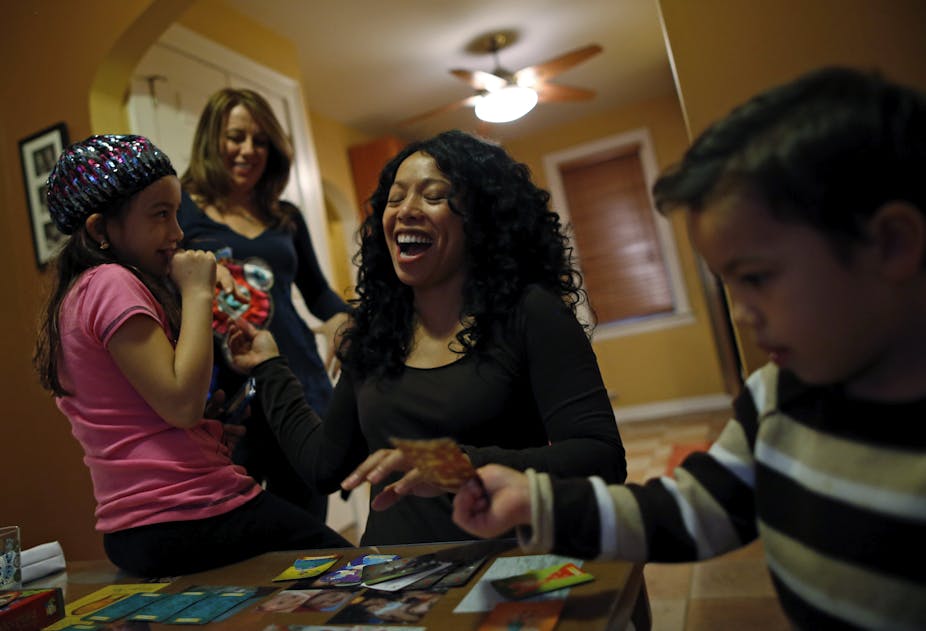When the Supreme Court invalidated same-sex marriage bans in June, the Justices acknowledged they had the kids in mind.
In the majority opinion, Justice Kennedy cited the infringement of the interests of children being raised by same-sex couples as one reason for the Court’s ruling.
Who are these kids? An estimated 220,000 children under the age of 18 are being raised in same-sex families in the United States. Half are nonwhite.
Protecting kids’ rights
My research, scholarship and advocacy efforts have focused on children, particularly black children, for the past 10 years. In an amicus brief filed in Obergefell – the Supreme Court case that ended same-sex marriage bans – my coauthors and I highlighted the legal and economic deprivations children in these families suffer when their parents can’t marry.
We cited landmark Supreme Court cases that make clear that children should not be punished, stigmatized or discriminated against by government action.
Brown v Board of Education, a landmark civil rights case, was one of the cases we relied on because it represents a high-water mark in the Supreme Court’s recognition of children’s constitutional rights. The plaintiffs in that case were black children asserting their constitutional rights against discrimination by state governments mandating segregated schools.
The Supreme Court cited our amicus brief to support its conclusion that constitutional protection of same-sex marriage affords children “the permanency and stability important to children’s best interests.”
Despite this acknowledgment, the Supreme Court’s opinion is preoccupied with the rights of adults and the expansion of the right to marry. It leaves children in same-sex families at risk.
Legal challenges

Children born into same-sex families frequently are biologically related to only one parent, and the law recognizes only that one parent. The legal status of the child’s relationship with her nonbiological parent varies from state to state.
Had the Obergefell decision been more focused on the rights of children in same-sex families, its ruling could have ensured that children’s relationships with their nonbiological parents were legally recognized and protected.
However, the opinion failed to reference children’s rights explicitly. As a result, as recent developments in state courts reveal, the rights of children in same-sex families remain vulnerable.
No marital presumption

The law referred to as the marital or paternity presumption automatically recognizes a legal parent-child relationship between children born into a marriage and their mothers’ husbands – without considering biology. In most states, this law affords legally enforceable rights to both the father and the child.
A New York court recently ruled that the presumption does not apply to same-sex spouses, reasoning that the “presumption of legitimacy … is one of a biological relationship, not of legal status.”
In Florida, three sets of same-sex spouses filed suit in federal court challenging the refusal of state officials to put both parents’ names on their children’s birth certificates.
Second-parent adoptions and parenting judgments, which are alternative ways of creating a legal parent-child relationship, could protect children’s relationships with their nonbiological parents. However, even in the dozen or so states that permit adoptions by same-sex spouses, those adoptions are not always recognized in sister states.
Three months after the Obergefell decision, the Alabama Supreme Court refused to recognize a lesbian mother’s adoption of her three nonbiological children granted by a Georgia court in 2007. The court reasoned that Alabama does not need to respect the adoptions because it determined the Georgia court didn’t properly apply Georgia law when granting them.
Loss of wealth
Even after the Obergefell decision, children are being deprived of important legal, economic and social benefits and protections that would result from a legal parental relationship with both of their parents.
Children in same-sex families are losing out on worker’s compensation benefits, social security benefits, state health insurance, civil service benefits, inheritance and wrongful death proceeds. Denial of these benefits could deprive children of thousands – or in rare cases, even millions – of dollars.
Children can also be deprived of the benefit of parental decision-making authority when it comes to health decisions, securing a passport and registering for school.
Imagine a boy is being raised by two mothers. If his biological mother dies, his “other mother” would have no custody claim. The boy could end up in foster care.
Such laws can have a powerful and adverse financial and legal impact.
According to the Williams Institute, which the Supreme Court cited in Obergefell, same-sex families raising children are twice as likely to earn incomes near the poverty level.
Many of these children are already challenged by experiences informed by their race, ethnicity and socieoeconomic status. Depriving this demographic of important financial and legal protections renders them even more vulnerable. It also compromises the permanency and stability the majority of the Supreme Court recognized as important to children’s interests.
The next round of litigation relating to same-sex families should focus on children’s rights to legal parentage by both of their parents. Children should be the plaintiffs in these cases, and like the children in Brown v. Board of Education, their rights should command constitutional protection.

